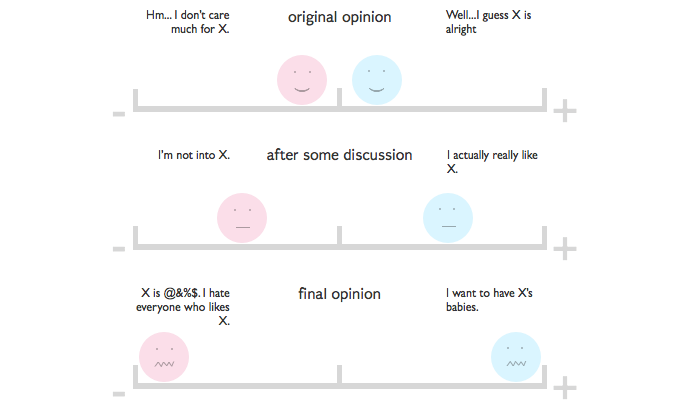Thought Polarisation: How to prevent pointless arguments
 Since I started studying Psychology more than 4 years ago, I have come across lots and lots of different theories. The one that has definitely had the biggest impact on my everyday behaviour is the theory of thought polarisation, which describes how opinions diverge over time. Understanding the underlying mechanisms of this phenomena can truly revolutionize your relationships by saving you many pointless arguments with your boyfriend, husband, friends or family!
Since I started studying Psychology more than 4 years ago, I have come across lots and lots of different theories. The one that has definitely had the biggest impact on my everyday behaviour is the theory of thought polarisation, which describes how opinions diverge over time. Understanding the underlying mechanisms of this phenomena can truly revolutionize your relationships by saving you many pointless arguments with your boyfriend, husband, friends or family!
What is thought polarisation?
Thought polarisation occurs when during a conversation two people reach a topic which they disagree on, but only slightly. The longer they keep talking about it, the more they will disagree. "I don't quite like xyz as much as you do, I'm pretty neutral towards it actually" can quickly turn into "Omg I hate xyz, I cannot believe you are into xyz, you must be totally (insert insulting adjective)". Try to spot this pattern in everyday conversations, you will probably be amazed by how common it is and how many arguments are based on this.
Why do our opinions escalate like that?
Differences in opinion always get exaggerated. This happens because of the confirmation bias: Once we have made up our mind about something, we will search for evidence that proves our initial opinion. All humans have this cognitive bias because from an evolutionary perspective it is pretty costly to constantly change your opinion - you would never get anything done. Also, consistency is a highly valued trait in our modern society; people who change their opinions or values unreasonably often tend to be viewed as fickle, confused, irrational and two-faced. For these reasons being consistent has more benefits in the long-term, which is why we are programmed to aim for consistency.
How does the confirmation bias lead to thought polarisation?
Say you dislike something a little tiny bit, like a celebrity (let's use Lady Gaga as an example :)) and you know the person you are talking to likes her at least somewhat. Whenever you're expressing an opinion the other person disagrees with, you are prompted to explain yourself. So you search for negative things to say about Lady Gaga, and the other person will do the same in the other direction. For every positive aspect they come up with, you find another negative aspect, because you want to be consistent in your opinion. Consider all the negative things about Lady Gaga that will be floating around in your head after a while: no wonder your opinion of her gets lower and lower. So actually, whenever thought polarisation happens, it is not really about two people fighting to be right, it happens because both of you are desperately trying to maintain a consistent opinion of something.
How to avoid pointless fights caused by thought polarisation?
The key is using your metacognition, which means evaluating your own thought process. First, realise that you are in a situation that could potentially lead to an escalation of opinions. Then, stop trying to prove your opinion, especially if it isn't particularly extreme in the first place. If it is only slightly more positive or negative than neutral, you and your conversation partner's opinion are likely to be very close anyway.
For more relationship advice, check out: Happy Couples - What's their secret?
Have you ever noticed thought polarisation occurring in arguments with your friends, family, etc. ?
